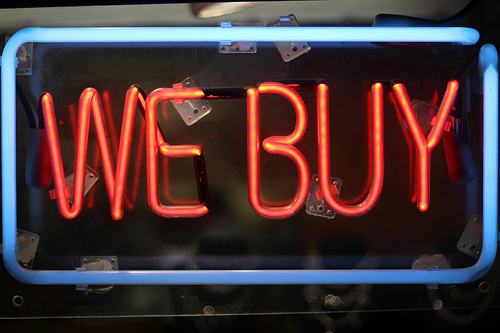

The latest Wired has a great piece by Matt Schwartz on what he terms "retail hacking".
He describes a confluence of forces that have given rise to the emergence of consumers who will devote hours to hacking the system to get deals and how this world has been made accessible to masses of consumers through the efforts of new players like Groupon and Living Social.
Groupon's genius, is to to take the time consuming and previously unattractive world of coupon shopping from the striving fringes of culture and make it mainstream cool. Getting a deal on Groupon is nothing to be ashamed of, instead, it's something you brag about. This is the reason Goggle is so interested in buying Groupon for billions of dollars.
Schwartz describes the emergence of the new deal-driven consumer- "the retail hacker".
"Take a step back, though, and what Groupon represents is something far bigger. It’s the mainstreaming of a new current in American consumerism, an attitude born of the Internet’s DIY ethos and nurtured by the hard economic times. One might call it retail hacking: the reconception of shopping as not just a full-time job but a contact sport, a scrum in which consumers increasingly refuse to buy on the terms dictated to them. A whole network of so-called deal-hunting sites, each with a large and devoted community, has sprung up for users to trade inside tips about little-known bargains; the largest of these sites, SlickDeals, has more than 700,000 registered members.
In this passionate consumer underground, techniques for chiseling a few percentage points (or more) off a sticker price can quickly spread to millions of shoppers. The process of selling a DVD player or even a new razor to the growing ranks of self-educated buyers is becoming as tortuous as selling them a new car. GetHuman.com, a continuously updated list of direct customer service lines and telephone-prompt guides, is undermining the ability of companies to resolve calls with automated systems. Consumers who have learned to haggle on prices at large chain stores—Target, Home Depot, Best Buy, and more—share their stories and methods on sites like the Consumerist, a blog that has become a hub for retail hackers. When Ely Rosenstock, a 29-year-old social media consultant from New York, wanted to cancel his Verizon service and buy the new iPhone, he found a loophole that let him leave his two-year contract with no termination fee; after he made this argument stick with Verizon customer service, he posted a detailed how-to video on YouTube that has been viewed more than 180,000 times."
The article implies that the way we think about selling, about deals and about pricing probably all needs to change. The forces of Web 3.0, "The Crowd", consumer empowerment and frugality are all coming together to create a radically new environment.
This is an environment that's forcing both brands and retailers to think differently about how they sell.
Posted by Ed Cotton
The widespread availability of technology especially using the internet should create more opportunities for retailers and brands to play with more flexible pricing models that shift based on demand or situations like weather.
Here's an example of an on-demand pricing pilot for San Francisco.
SFpark Overview from SFpark on Vimeo.
Think about how your brand could play with price, what opportunities might there be to raise or lower prices in response to external stimuli. Should/could people pay more for drinks in warmer weather and less in colder weather?Via Good
Posted by Ed Cotton
"Strathclyde police were called to the Ryanair flight at Prestwick airport in Ayrshire yesterday after the plane was held on the runway due to delays caused by an air traffic controllers strike in France.
The flight, to Girona in Spain, had been due to leave at 2pm but by 6pm the flight's besieged crew called the police.
The 168 passengers, many with children, became increasingly angry after the crew refused to open the refreshment trolleys, saying they were forbidden from doing so until the flight was in the air. Others wanted to get off the plane."
However, the fact it's Ryanair makes it especially interesting because this is a brand that's taken no frills to an absolute extreme. The company is planning on charging passengers to use the rest room and is well known for charging customers extra for everything. This is a core part of the branding strategy.If your prepared to go to extreme lengths to deliver the lowest possible fares and if your business is always trying to find any ways to make extra revenue by charging for the things your competitors probably give away as standard, you might just have a very distorted view of your customers.
Brands have always been used as signs and signals of standards and supposedly quality. Ryanair appears to have taken a post-post modern view of branding and inverted it on its ahead. Maybe the company believes that its customers are paying such low prices, that they have no right to expect any level of service.
The company seems to revel in the buzz can be generated for their crazy schemes to deliver the lowest prices.
A Test for Standing Passenger Flights
The problem is that the airline business is not static and revolves around a highly aggressive set of competitors who are determined to get business at all costs. Unless Ryanair has a pricing model that's so far below any of its competitors, it better watch out, because the mutiny it experienced in Prestwick, might spread to other passengers.
No frills has been a territory circulated by many brands, especially in these tough times, but there have to limits to what consumers are prepared to expect service wise, despite the fearsome attraction of low prices.
I guess Ryanair is engaged in an interesting experiment to test those limits.
Posted by Ed Cotton
I think it's interesting how Starbucks just announced a new pricing play- basically splitting it's market in two by raising prices on the more sophisticated drinks and lowering them on the simpler ones.
It seems like a smart play for these times which seems to be predicted on the idea that there's a mass market opportunity for basic coffee that Starbucks wants to be part of and doesn't want McDonald's to steal it's share and it's got it's captive base who it wants to pay more.
Time will tell to see if this pays off.
Posted by Ed Cotton
It will be interesting to see if this idea spreads, given how price sensitive people are at this moment in time.
Posted by Ed Cotton
With the mobile web, brands are going to have considerable opportunity to take advantage.
There's a good paper on the topic available from the University of Exeter,Business School, published in 07, but seems right on point for this moment in time.
"Consequently, buyers can now purchase through a channel that is most
conducive for them, i.e. the channel that gives them the greatest value. Since the expense in purchasing a product is both the price of the product as well as the cost of acquiring it, different pareto losses exist for different channels. Converting such pareto losses would give rise to many permutations in terms of pricing. With markets now being divided into finer segments, leading to the term micro‐segmentation, it is now possible to price for each of these micro‐segments and therefore allow firms to refine their revenue management strategies. With 3rd generation mobile telephony, TV on the web, music on the move, convergence of mobile and internet as well as other technologies, pricing and revenue management strategies have to be clever, creative and innovative (Jonason, 2004). Firms that are any less dynamic run the risk of being left behind."
Posted by Ed Cotton
